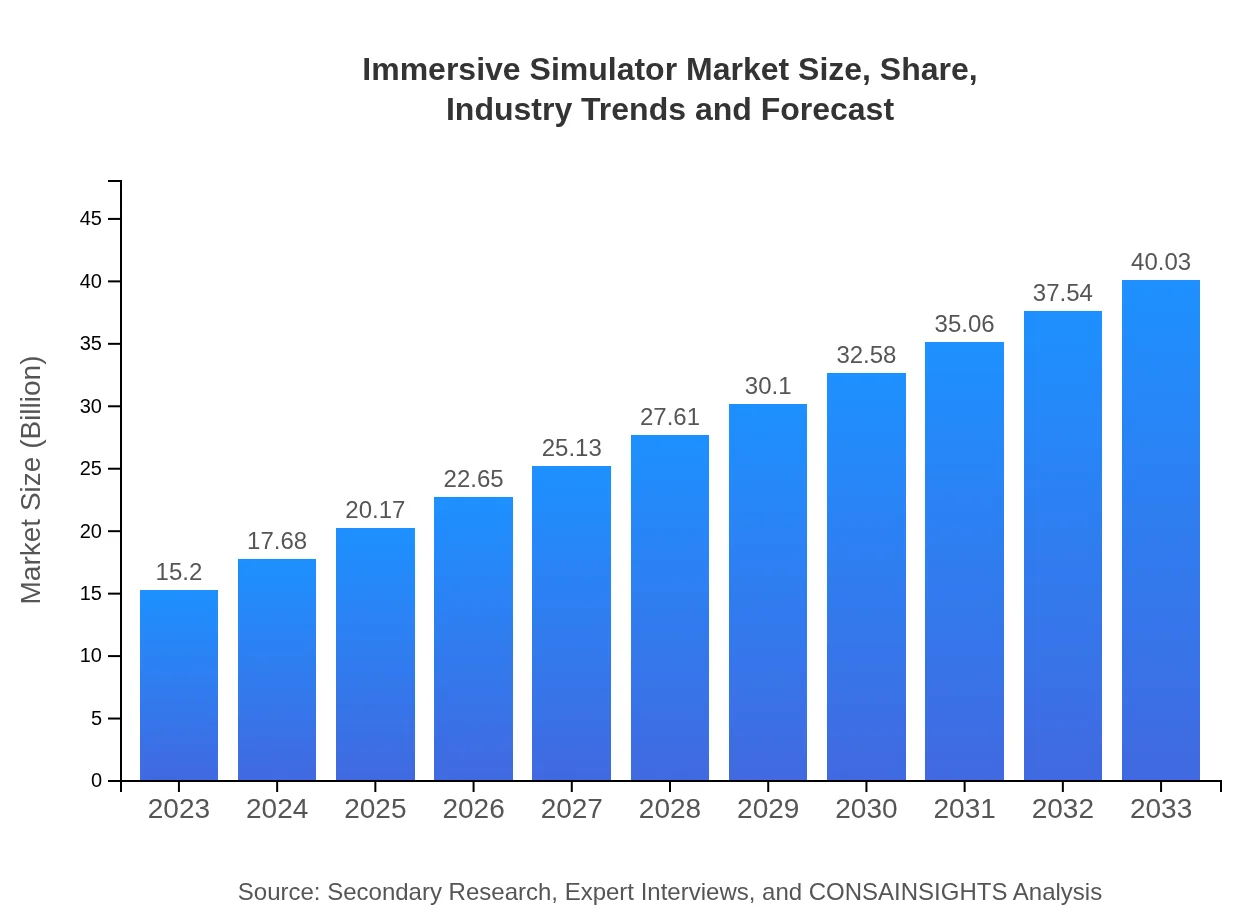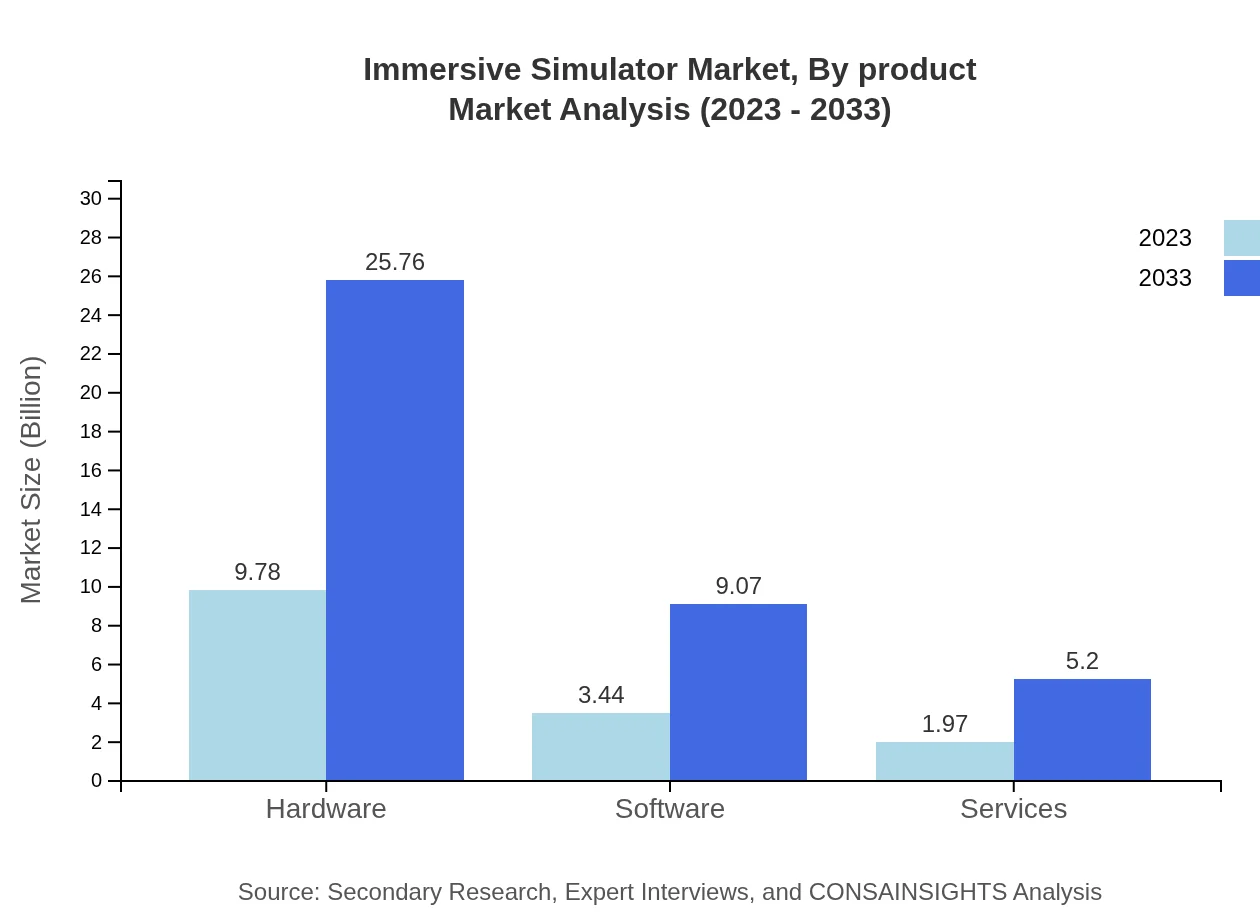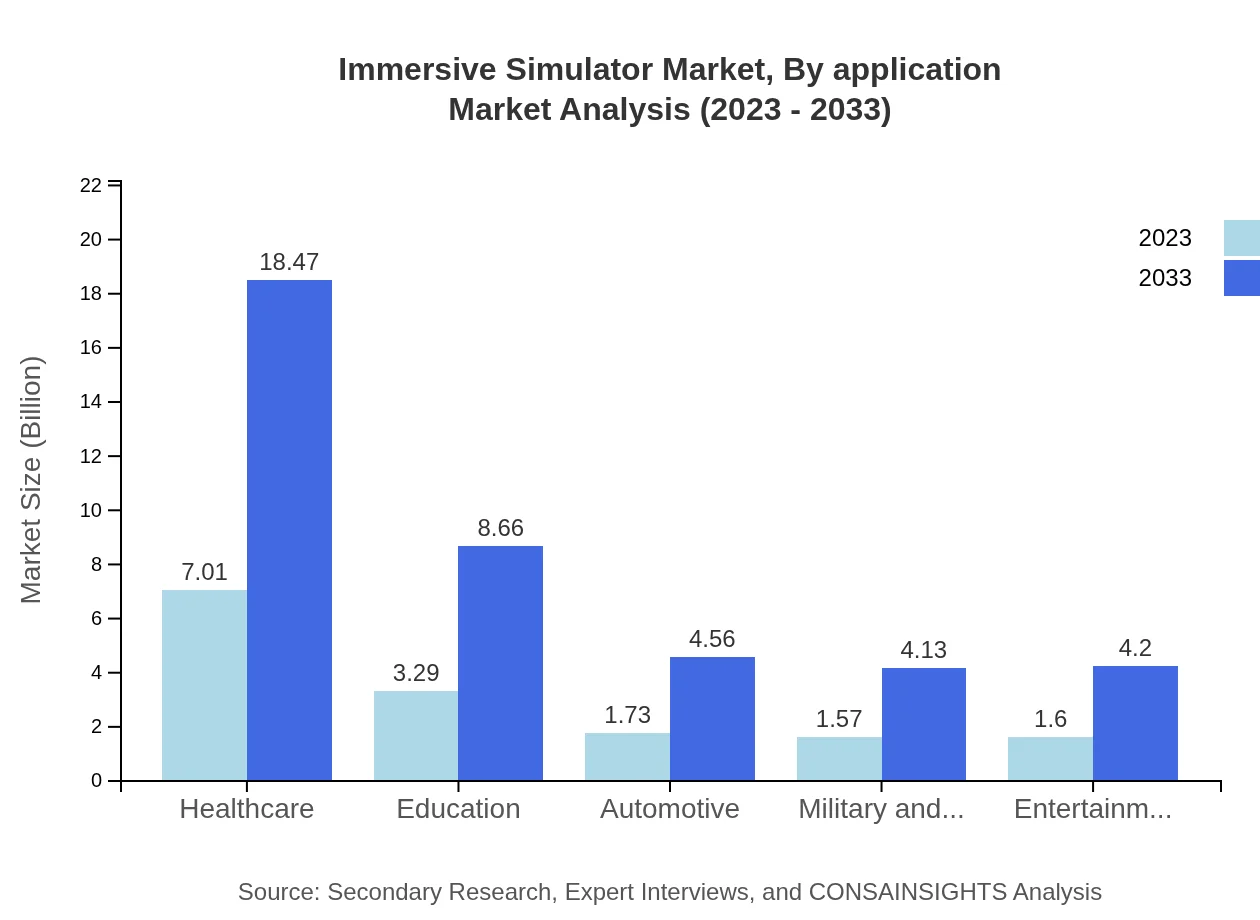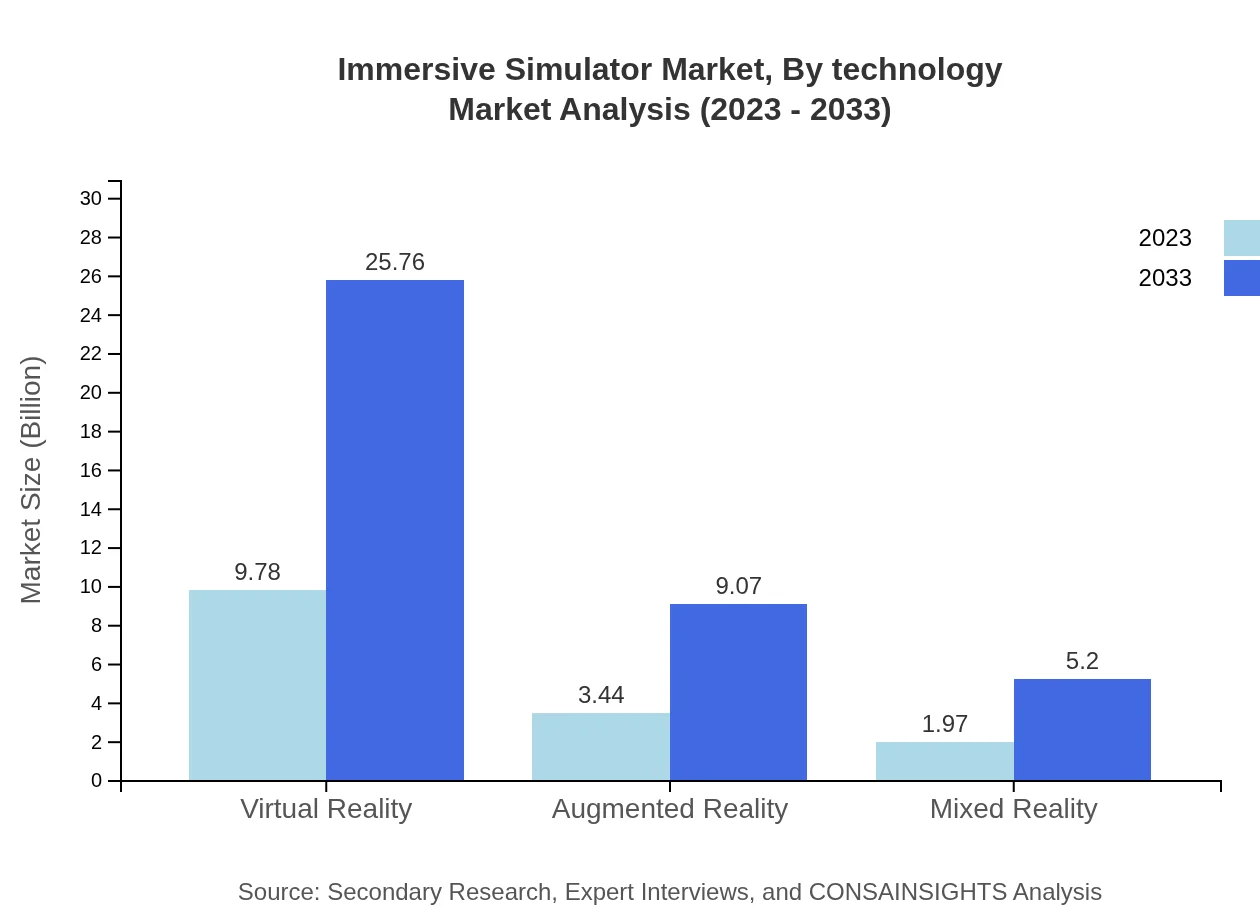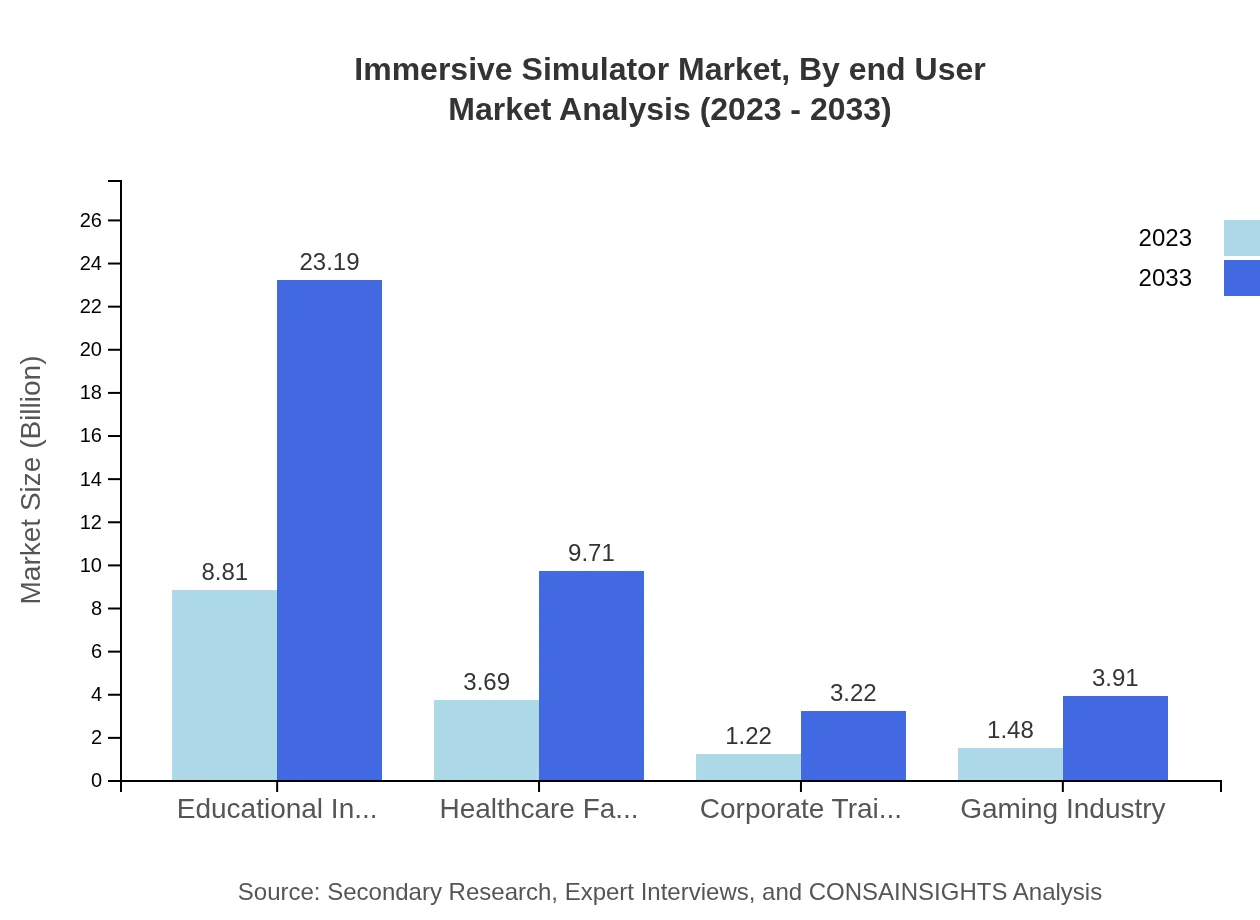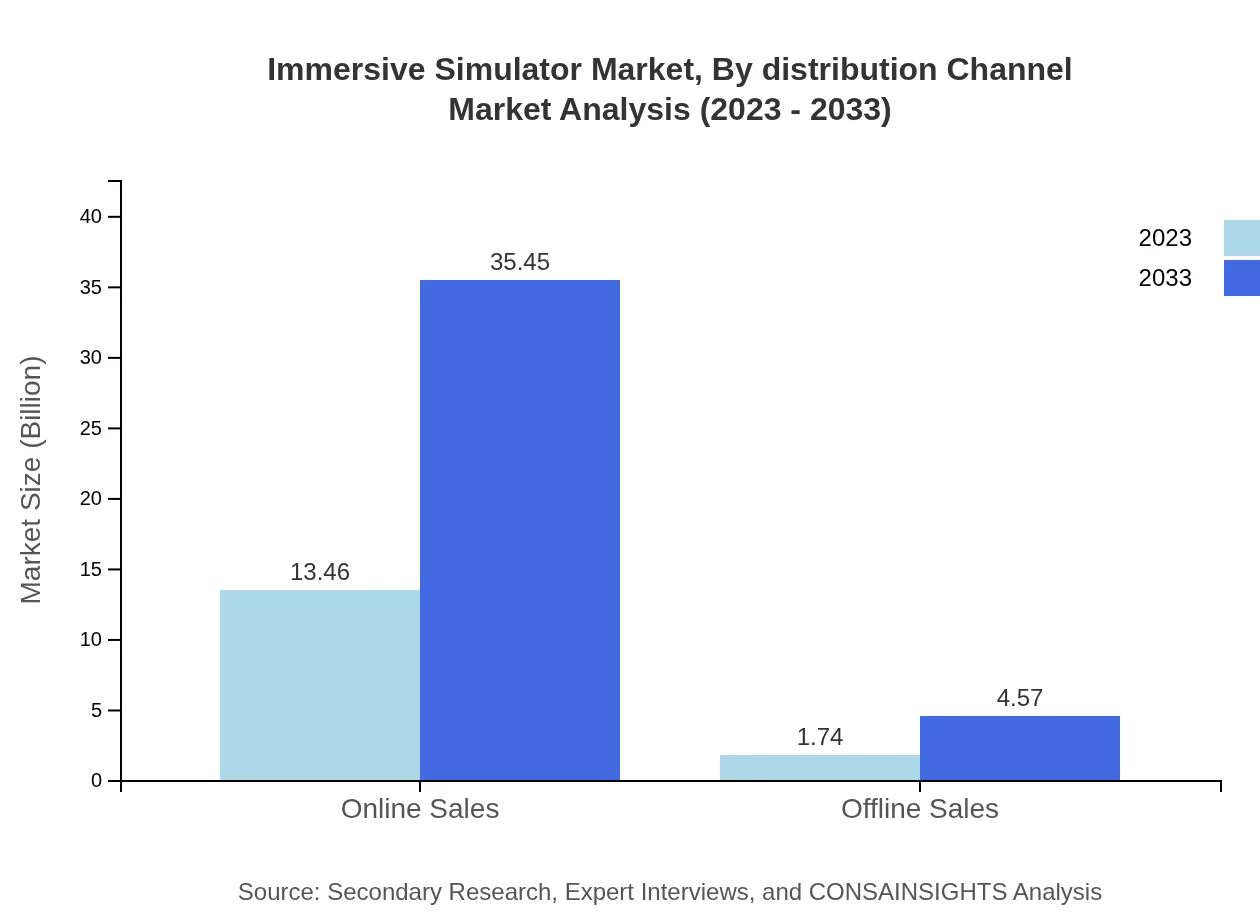Immersive Simulator Market Report
Published Date: 31 January 2026 | Report Code: immersive-simulator
Immersive Simulator Market Size, Share, Industry Trends and Forecast to 2033
This report covers the comprehensive analysis of the Immersive Simulator market from 2023 to 2033, providing insights on market size, growth, segmentation, regional dynamics, key players, and expected trends and forecasts.
| Metric | Value |
|---|---|
| Study Period | 2023 - 2033 |
| 2023 Market Size | $15.20 Billion |
| CAGR (2023-2033) | 9.8% |
| 2033 Market Size | $40.03 Billion |
| Top Companies | Unity Technologies, PTC Inc., Epic Games, Microsoft Corporation |
| Last Modified Date | 31 January 2026 |
Immersive Simulator Market Overview
Customize Immersive Simulator Market Report market research report
- ✔ Get in-depth analysis of Immersive Simulator market size, growth, and forecasts.
- ✔ Understand Immersive Simulator's regional dynamics and industry-specific trends.
- ✔ Identify potential applications, end-user demand, and growth segments in Immersive Simulator
What is the Market Size & CAGR of Immersive Simulator market in 2023?
Immersive Simulator Industry Analysis
Immersive Simulator Market Segmentation and Scope
Tell us your focus area and get a customized research report.
Immersive Simulator Market Analysis Report by Region
Europe Immersive Simulator Market Report:
Europe’s market is expected to show notable growth from 4.71 billion USD in 2023 to 12.40 billion USD in 2033. With a strong focus on technological innovation, the gaming sector and educational institutions are pivotal in pushing forward the adoption of immersive simulators.Asia Pacific Immersive Simulator Market Report:
In the Asia Pacific region, the Immersive Simulator market is projected to grow from 2.57 billion USD in 2023 to 6.78 billion USD in 2033. Factors contributing to this growth include rising investment in advanced training systems, increasing demand for VR gaming, and supportive government initiatives for technology adoption in education.North America Immersive Simulator Market Report:
North America holds a significant share of the market, with size expanding from 5.65 billion USD in 2023 to 14.89 billion USD by 2033. A major contributor is the technology advancement in the gaming and healthcare sectors, along with robust investments from corporations in employee training tools.South America Immersive Simulator Market Report:
The market in South America is smaller, anticipated to increase from 0.18 billion USD in 2023 to 0.47 billion USD in 2033. Growth in this region is limited by economic constraints; however, increasing focus on interactive learning in educational sectors is driving gradual adoption.Middle East & Africa Immersive Simulator Market Report:
The Middle East and Africa market is expected to grow from 2.08 billion USD in 2023 to 5.49 billion USD in 2033. This growth will be driven by increased demand for advanced simulation technologies in military training and educational initiatives.Tell us your focus area and get a customized research report.
Immersive Simulator Market Analysis By Product
Hardware dominates the Immersive Simulator product segment, representing 9.78 billion USD in 2023 and expected to reach 25.76 billion USD by 2033. Software and services also play critical roles, with respective sizes of 3.44 billion USD and 1.97 billion USD in 2023, forecasted to grow to 9.07 billion USD and 5.20 billion USD by 2033.
Immersive Simulator Market Analysis By Application
Applications are vigorous in educational institutions, healthcare facilities, corporate training, and gaming industries. Educational institutions are anticipated to expand from 8.81 billion USD in 2023 to 23.19 billion USD in 2033, making it the leading segment, followed by healthcare and corporate training.
Immersive Simulator Market Analysis By Technology
Technological advances in virtual reality, augmented reality, and mixed reality fuel market segments, with virtual reality holding the largest share at 64.37%, followed by augmented reality at 22.65% and mixed reality at 12.98%.
Immersive Simulator Market Analysis By End User
Key end-user industries include healthcare, education, gaming, and military & defense. With a staggering 46.14% share in 2023, healthcare emerges as the predominant sector, anticipated to grow significantly and dominate through 2033.
Immersive Simulator Market Analysis By Distribution Channel
Distribution channels in the Immersive Simulator market are primarily focused on online sales, which represented 88.57% market share in 2023, with significant growth expected through 2033, complemented by offline sales accounting for the remaining share.
Immersive Simulator Market Trends and Future Forecast
Tell us your focus area and get a customized research report.
Global Market Leaders and Top Companies in Immersive Simulator Industry
Unity Technologies:
A leading platform for creating and operating interactive, real-time 3D content globally. Unity's powerful engine supports the development of immersive simulations for various applications, making it a key player in this market.PTC Inc.:
PTC provides a robust context for AR technologies with its Vuforia platform, enabling organizations to harness AR for enhanced visualization and training, playing a crucial role in the Immersive Simulator landscape.Epic Games:
Epic's Unreal Engine is widely used in developing high-fidelity simulations and games, leading the charge in innovation within the immersive technology sector.Microsoft Corporation:
Known for its HoloLens and investments in mixed reality solutions, Microsoft significantly impacts immersive technologies across various industries, particularly in education and corporate training.We're grateful to work with incredible clients.









FAQs
What is the market size of immersive Simulator?
The immersive simulator market is currently valued at approximately $15.2 billion with a projected compound annual growth rate (CAGR) of 9.8% from 2023 to 2033. This growth reflects increasing demand across various sectors, significantly enhancing market opportunities.
What are the key market players or companies in this immersive Simulator industry?
Key market players in the immersive simulator industry include leading technology firms, hardware manufacturers, and software developers. Companies such as Unity Technologies, Dassault Systèmes, and PTC are notable for their innovative solutions in immersive simulations.
What are the primary factors driving the growth in the immersive Simulator industry?
The growth in the immersive simulator industry is primarily driven by advancements in technology, increasing applications in training and education, rising demand in healthcare simulations, and a growing interest in virtual and augmented reality experiences.
Which region is the fastest Growing in the immersive Simulator?
Asia Pacific is currently the fastest-growing region in the immersive simulator market. Market size is expected to rise from $2.57 billion in 2023 to $6.78 billion in 2033, driven by increasing investment and technology adoption in the region.
Does ConsaInsights provide customized market report data for the immersive Simulator industry?
Yes, ConsaInsights offers customized market report data tailored to the needs of clients in the immersive simulator industry. This includes specific insights and analysis based on individual client requirements and market conditions.
What deliverables can I expect from this immersive Simulator market research project?
Deliverables from the immersive simulator market research project will typically include detailed market analysis, segment data, competitive landscape insights, and forecasts covering various regions and applications, ensuring comprehensive understanding.
What are the market trends of immersive simulator?
Current market trends in the immersive simulator industry include growth in virtual and augmented reality technologies, increased use in healthcare training, expansion of applications in corporate training, and a rising interest in gamification approaches in education.

